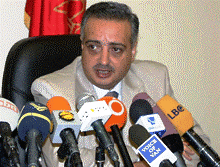 Lebanese Democratic Party leader MP Talal Arslan added his voice for supporting the establishment of a Lebanese Senate in addition to the parliament in Lebanon and stressed that this is a national demand .
Lebanese Democratic Party leader MP Talal Arslan added his voice for supporting the establishment of a Lebanese Senate in addition to the parliament in Lebanon and stressed that this is a national demand .
“A senate is a national demand … not only a Druze one,” Arslan was quoted as saying by his media office on Monday during a meeting with supporters.
“I openly back all steps that lead to the establishment of a senate,” he added.
The Progressive Socialist Party and the Future Movement have already supported the idea of establishing a senate in Lebanon at a time when the country’s political circles are divided over the best electoral law to be adopted for the 2013 parliamentary elections.
Bicameralism
In government, bicameralism is the practice of having two legislative or parliamentary chambers. The relationship between the two chambers of a bicameral legislature can vary. In some cases, they have equal power, and in others, one chamber is clearly superior to the other. It is commonplace in most federal systems to have a bicameral legislature. The United States, for example, has a bicameral legislature in which one chamber, the Senate, has an equal number of members representing each constituent state, and the members of the other chamber, theHouse of Representatives, number according to each state’s population.
Some political scientists believe that having a bicameral legislature makes meaningful political reforms more difficult to achieve and increases the risk of deadlock. This risk is greater in cases when both chambers have equal powers. Other political analysts argue strongly for the merits of the checks and balances that are provided by the bicameral model, which they believe helps prevent ill-considered legislation from being passed into law.
Not a new idea for Lebanon
A Lebanese senate is not a new idea. Indeed, Lebanon had a senate for a brief period during the French mandate but it was abolished in 1927, a year after it was established. Article 22 of the Lebanese Constitution states:
“With the election of the first Parliament on a national, non-confessional basis, a Senate is established in which all the religious communities are represented. Its authority is limited to major national issues.”
Furthermore, the Taef or Ta’if Agreement (1989) which ended the Lebanese Civil War reconfirmed the call for a senate among the list of required political reforms, using the same language found in the Constitution’s article 22.
The key condition for the establishment of a senate is “the election of the Parliament on a national, non-confessional basis.” What this means is that the sectarian quotas governing the distribution of seats in the current parliament would be removed. In other words, instead of electing their representatives to parliamentary seats reserved for specific sects (Maronite, Greek Orthodox, Sunni, Shiite, Druze , etc.), citizens would have the freedom to elect a member of any sect to be their representative in Parliament. Similarly, any citizen, from any sect, would have the freedom to be elected representative of their district.
PSP leader MP Walid Jumblatt who criticized the so called Orthodox electoral law which stipulates that each sect elects its own members to the parliament suggested that such a law can only be used for electing the Senate in Lebanon.

Leave a Reply
You must be logged in to post a comment.